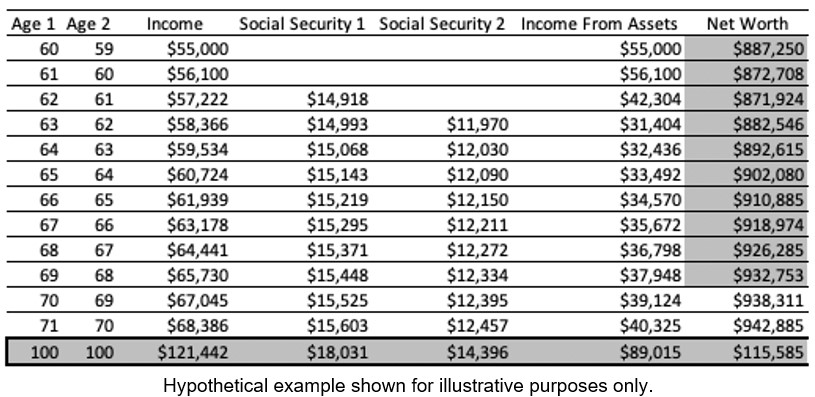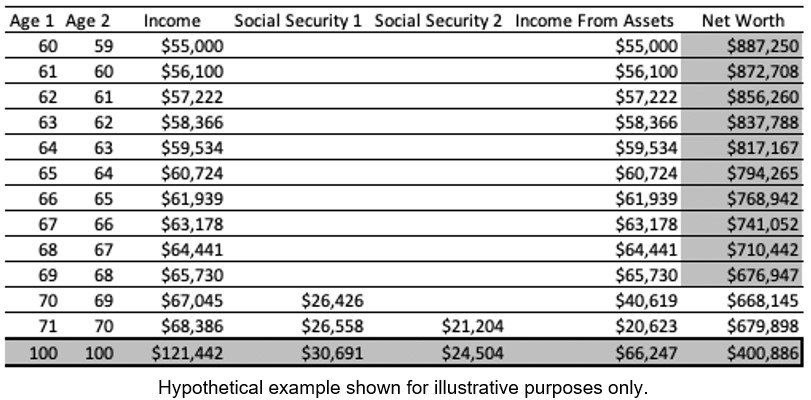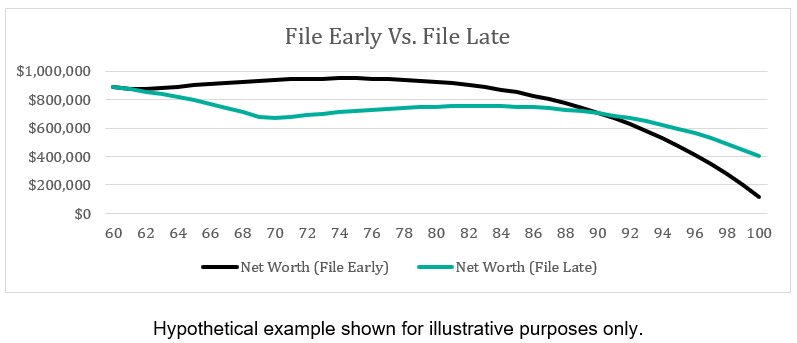Social Security Optimization If You Save More Than $250,000
When you choose to take benefits will make a difference in how your income and assets play out over many years. Let’s explore some scenarios.


Profit and prosper with the best of Kiplinger's advice on investing, taxes, retirement, personal finance and much more. Delivered daily. Enter your email in the box and click Sign Me Up.
You are now subscribed
Your newsletter sign-up was successful
Want to add more newsletters?

Delivered daily
Kiplinger Today
Profit and prosper with the best of Kiplinger's advice on investing, taxes, retirement, personal finance and much more delivered daily. Smart money moves start here.

Sent five days a week
Kiplinger A Step Ahead
Get practical help to make better financial decisions in your everyday life, from spending to savings on top deals.

Delivered daily
Kiplinger Closing Bell
Get today's biggest financial and investing headlines delivered to your inbox every day the U.S. stock market is open.

Sent twice a week
Kiplinger Adviser Intel
Financial pros across the country share best practices and fresh tactics to preserve and grow your wealth.

Delivered weekly
Kiplinger Tax Tips
Trim your federal and state tax bills with practical tax-planning and tax-cutting strategies.

Sent twice a week
Kiplinger Retirement Tips
Your twice-a-week guide to planning and enjoying a financially secure and richly rewarding retirement

Sent bimonthly.
Kiplinger Adviser Angle
Insights for advisers, wealth managers and other financial professionals.

Sent twice a week
Kiplinger Investing Weekly
Your twice-a-week roundup of promising stocks, funds, companies and industries you should consider, ones you should avoid, and why.

Sent weekly for six weeks
Kiplinger Invest for Retirement
Your step-by-step six-part series on how to invest for retirement, from devising a successful strategy to exactly which investments to choose.
If you have less than $250,000 saved for retirement, chances are your Social Security retirement benefits could be the main source of your retirement income. If this is true, then you may want to consider working as long as you can, or until age 70, and delay your retirement benefit so it can grow as much as possible. However, if you have more than $250,000 saved up for retirement, deciding when you should file for Social Security becomes a more nuanced question. Why? It’s because there can be a rippling effect throughout the rest of your retirement plan.
Assuming that your target retirement age is around 60 years old, and you expect a certain amount of income each year with a cost-of-living adjustment, your plan would need to account for the gap between when you retire and when your Social Security benefit starts.
Filing for Social Security Too Early vs. Too Late
For example, if you had a target retirement date of 60 years old and file for your Social Security benefits at 62 years and one month, you’d have a gap of about two years between when you retire and when you start receiving your benefit. That means you’d potentially have to take additional income to bridge the gap or make up the difference until your Social Security benefit started.
From just $107.88 $24.99 for Kiplinger Personal Finance
Become a smarter, better informed investor. Subscribe from just $107.88 $24.99, plus get up to 4 Special Issues

Sign up for Kiplinger’s Free Newsletters
Profit and prosper with the best of expert advice on investing, taxes, retirement, personal finance and more - straight to your e-mail.
Profit and prosper with the best of expert advice - straight to your e-mail.
If you had a target retirement date of 60 years old and intended to file for your Social Security benefits at age 70, you’d have a 10-year gap, which could have an even greater impact on your portfolio as you bridge the gap.
Admittedly, there’s no simple solution. Filing early, like around 62 or 63, has its benefits and detriments. The same goes for those who decide to file late, as in around 68 to 70. Here’s an expression I came up with some years ago to help explain how to compare the benefits and detriments potentially found when you consider your Social Security filing strategies: If you file too early, your income may be hurting. If you file too late, you could be hurting your estate.
Let’s address each option. Here is a quick breakdown of what it could look like if you were to file early.
Strategy 1: Take Social Security Early

The third column above shows the total projected retirement income for a couple with one spouse who’s younger than the other. They start receiving the older spouse’s Social Security benefit at age 62 (column four). Column five represents the younger spouse’s benefit. The projected net worth, column seven, has an assumed growth rate of 5%.
Notice how the net worth at age 71 is projected to be $942,885, and at age 100, the net worth is projected to be $115,585. During the first 10 years, because Social Security had been turned on early, the estate was better preserved. In other words, this couple did not have to take as much income from their assets to meet their retirement income goal.
Now let’s look at the other strategy and then compare.
Strategy 2: Take Social Security Late

In this strategy, notice how the net worth goes further down during the first 10 years than in the first example. This is because more income must be pulled from assets to meet the target retirement income. Essentially, the assets are bridging the gap between when this couple retires and when they file for Social Security. Once Social Security turns on at age 70, the portfolio doesn’t have to provide as much income to meet the retirement income goal.
When someone files for their Social Security benefit at 70 years old, they claim their maximum possible benefit. This helps the portfolio, growing at an assumed 5% annually, recover. This is why the portfolio has the potential to recover and is projected to be around $400,886 by age 100.
Let’s compare what the projected net worth looks like in both scenarios.

Notice how the net worth goes down when you file late. That is because the portfolio is providing all the retirement income. The green Net Worth (File Early) line illustrates how taking Social Security early, even at a discount, requires less income from the portfolio, helping the portfolio maintain a higher total balance.
It’s important to note the differences based on the years. When you compare the projected net worth at age 69, Strategy 1 projects a net worth of $932,753, while Strategy 2 projects $676,947, a $255,806 difference. That’s a lot of money potentially going to beneficiaries.
Now let’s compare the two strategies at age 100. Strategy 1 projects a net worth of $115,585, while Strategy 2 projects $400,886, a $285,301 difference. Again, that’s a lot of money to beneficiaries.
In conclusion, when you consider your Social Security strategy, it is important to review how when you file could affect your portfolio. If you are more concerned about passing as much as you can to your beneficiaries, then you may consider filing early to preserve more of your portfolio in the earlier part of your retirement. If you want to maximize your income, you may consider filing late to get the highest benefit possible.
A few other factors that may affect when you should file include how much you expect to get at full retirement age, does your spouse qualify for their own benefit, or does it make sense to consider the spousal benefits, your total retirement income and how that income is generated, and so on.
The folks who work at the Social Security Administration can help answer some questions, but they are limited in what they can and cannot do. Working with a financial adviser or using third-party software to run the numbers on your potential lifetime benefits can make a huge difference.
Social Security optimization is a nuanced process. There’s no silver bullet here. The trick is to file for your benefit based on what you value more — protecting your estate or maximizing your income.
Profit and prosper with the best of Kiplinger's advice on investing, taxes, retirement, personal finance and much more. Delivered daily. Enter your email in the box and click Sign Me Up.

Mike Decker, NSSA®, is the founder of Kedrec Wealth, a flat-fee financial planning firm that offers one-time services or ongoing management for a fixed monthly fee. He is also the creator of Cash Flow and Capital, an app designed to help people develop a healthier relationship with money by improving awareness around spending and decision-making. Mike is the author of How to Retire on Time, How to Prepare to Retire on Time (coming soon) and The Bear Market Protocol (also coming soon). He shares practical retirement and wealth-building strategies through his podcast, weekly newsletter and two YouTube channels.
-
 Quiz: Do You Know How to Avoid the "Medigap Trap?"
Quiz: Do You Know How to Avoid the "Medigap Trap?"Quiz Test your basic knowledge of the "Medigap Trap" in our quick quiz.
-
 5 Top Tax-Efficient Mutual Funds for Smarter Investing
5 Top Tax-Efficient Mutual Funds for Smarter InvestingMutual funds are many things, but "tax-friendly" usually isn't one of them. These are the exceptions.
-
 AI Sparks Existential Crisis for Software Stocks
AI Sparks Existential Crisis for Software StocksThe Kiplinger Letter Fears that SaaS subscription software could be rendered obsolete by artificial intelligence make investors jittery.
-
 Social Security Break-Even Math Is Helpful, But Don't Let It Dictate When You'll File
Social Security Break-Even Math Is Helpful, But Don't Let It Dictate When You'll FileYour Social Security break-even age tells you how long you'd need to live for delaying to pay off, but shouldn't be the sole basis for deciding when to claim.
-
 I'm an Opportunity Zone Pro: This Is How to Deliver Roth-Like Tax-Free Growth (Without Contribution Limits)
I'm an Opportunity Zone Pro: This Is How to Deliver Roth-Like Tax-Free Growth (Without Contribution Limits)Investors who combine Roth IRAs, the gold standard of tax-free savings, with qualified opportunity funds could enjoy decades of tax-free growth.
-
 One of the Most Powerful Wealth-Building Moves a Woman Can Make: A Midcareer Pivot
One of the Most Powerful Wealth-Building Moves a Woman Can Make: A Midcareer PivotIf it feels like you can't sustain what you're doing for the next 20 years, it's time for an honest look at what's draining you and what energizes you.
-
 I'm a Wealth Adviser Obsessed With Mahjong: Here Are 8 Ways It Can Teach Us How to Manage Our Money
I'm a Wealth Adviser Obsessed With Mahjong: Here Are 8 Ways It Can Teach Us How to Manage Our MoneyThis increasingly popular Chinese game can teach us not only how to help manage our money but also how important it is to connect with other people.
-
 Looking for a Financial Book That Won't Put Your Young Adult to Sleep? This One Makes 'Cents'
Looking for a Financial Book That Won't Put Your Young Adult to Sleep? This One Makes 'Cents'"Wealth Your Way" by Cosmo DeStefano offers a highly accessible guide for young adults and their parents on building wealth through simple, consistent habits.
-
 Global Uncertainty Has Investors Running Scared: This Is How Advisers Can Reassure Them
Global Uncertainty Has Investors Running Scared: This Is How Advisers Can Reassure ThemHow can advisers reassure clients nervous about their plans in an increasingly complex and rapidly changing world? This conversational framework provides the key.
-
 I'm a Real Estate Investing Pro: This Is How to Use 1031 Exchanges to Scale Up Your Real Estate Empire
I'm a Real Estate Investing Pro: This Is How to Use 1031 Exchanges to Scale Up Your Real Estate EmpireSmall rental properties can be excellent investments, but you can use 1031 exchanges to transition to commercial real estate for bigger wealth-building.
-
 The 8 Stages of Retirement: An Expert Guide to Confidence, Flexibility and Fulfillment, From a Financial Planner
The 8 Stages of Retirement: An Expert Guide to Confidence, Flexibility and Fulfillment, From a Financial PlannerRetirement planning is less about hitting a "magic number" and more about an intentional journey — from understanding your relationship with money to preparing for your final legacy.